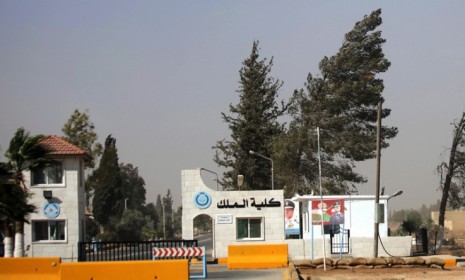Syria's defector pilot: 4 takeaways
The unprecedented, high-profile escape is a huge embarrassment for President Bashar al-Assad. What does it mean for Syria's pro-democracy uprising?

A free daily email with the biggest news stories of the day – and the best features from TheWeek.com
You are now subscribed
Your newsletter sign-up was successful
A Syrian air force pilot changed course on a training mission Thursday and landed his Soviet-era MiG-21 warplane in neighboring Jordan, which promptly granted him asylum. The pilot, identified as Col. Hassan al-Mirei Hamadeh, was the first member of embattled President Bashar al-Assad's air force to defect since Assad began battling a pro-democracy uprising in March 2011. What does the pilot's daring flight mean? Here, four talking points:
1. Assad's support network is crumbling
"The air force is considered fiercely loyal to Assad's regime," say Bassem Mroue and Jamal Halaby of The Associated Press, "and the defection suggests some of Syria's most ironclad allegiances are fraying." Most of the air force's commanders are members of the ruling Alawite minority, but most of its pilots, including Hamadeh, belong to the Sunni Muslim majority, "which forms the backbone of resistance" to Assad, say Rick Gladstone and Alan Cowell in The New York Times. The loss of the pilots' allegiance would be hugely significant. And reportedly, more senior military officers are preparing to join the opposition, too.
The Week
Escape your echo chamber. Get the facts behind the news, plus analysis from multiple perspectives.

Sign up for The Week's Free Newsletters
From our morning news briefing to a weekly Good News Newsletter, get the best of The Week delivered directly to your inbox.
From our morning news briefing to a weekly Good News Newsletter, get the best of The Week delivered directly to your inbox.
2. Some soldiers are sickened by bombing civilians
The pilot's escape came after the regime stepped up "allegedly indiscriminate air assaults" on rebel-controlled civilian areas, says Ali Gharib at Think Progress. Hamadeh reportedly fled after "refusing orders to bomb domestic targets." Opposition sources say the 44-year-old pilot smuggled his own family out of Idlib province and into Turkey before making his move, according to Reuters. The dramatic escape reportedly came after the family's hometown, Kfar Takharim, was repeatedly shelled for months.
3. Syria is on increasingly lousy terms with its neighbors
This defection will "complicate Syrian-Jordanian relations," says Alexander Reed Kelly at Truthdig. Jordan, which did $470 million in trade with Syria in 2011 and depends on its neighbor for access to the Mediterranean, had to know that granting asylum to Hamadeh would infuriate Damascus, yet it refused to send the pilot back anyway. Jordan's criticism of Assad has "paled in comparison to Turkey's," says Alexander Marquardt at ABC News, but it's increasingly clear whose side Assad's neighbors are on.
A free daily email with the biggest news stories of the day – and the best features from TheWeek.com
4. Assad is losing the propaganda war... but not the real war
The defection is "obviously a public embarrassment to the authorities in Damascus," says Jim Muir at BBC News, because it shows that "dissidence has penetrated into the heart of one of the regime's key pillars of support." But it would be unwise to read too much into what is essentially a propaganda coup. You can't "assume that this single incident will lead to a stampede or a collapse of the armed forces." Thousands of ground forces and isolated officers have jumped ship over the last year, but so far Assad hasn't lost any major fighting units.
-
 Alexei Navalny and Russia’s history of poisonings
Alexei Navalny and Russia’s history of poisoningsThe Explainer ‘Precise’ and ‘deniable’, the Kremlin’s use of poison to silence critics has become a ’geopolitical signature flourish’
-
 Are Hollywood ‘showmances’ losing their shine?
Are Hollywood ‘showmances’ losing their shine?In The Spotlight Teasing real-life romance between movie leads is an old Tinseltown publicity trick but modern audiences may have had enough
-
 A dreamy long weekend on the Amalfi Coast
A dreamy long weekend on the Amalfi CoastThe Week Recommends History, pasta, scenic views – this sun-drenched stretch of Italy’s southern coast has it all